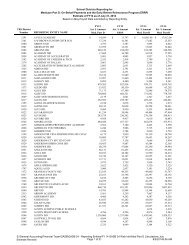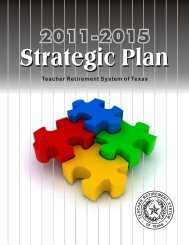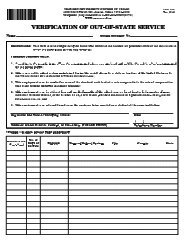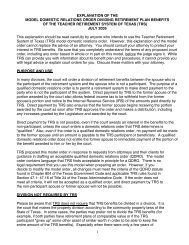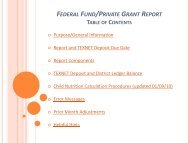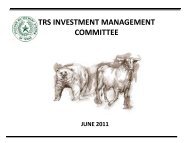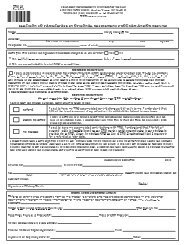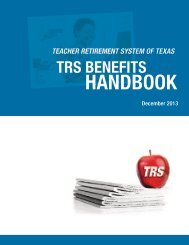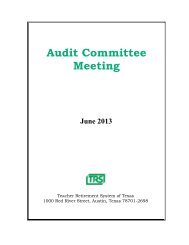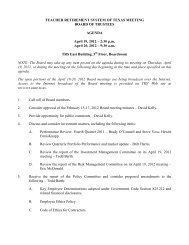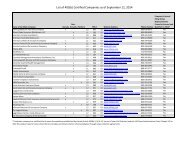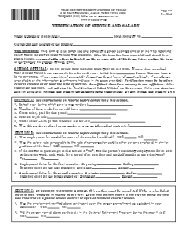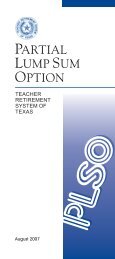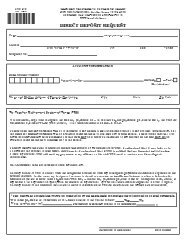TRS 2011 Comprehensive Annual Financial Report
TRS 2011 Comprehensive Annual Financial Report
TRS 2011 Comprehensive Annual Financial Report
You also want an ePaper? Increase the reach of your titles
YUMPU automatically turns print PDFs into web optimized ePapers that Google loves.
TEACHER RETIREMENT SYSTEM OF TEXAS COMPREHENSIVE ANNUAL FINANCIAL REPORT <strong>2011</strong><br />
<strong>2011</strong> Changes in <strong>TRS</strong> Law<br />
follow retirement, a retiree will forfeit monthly annuities<br />
for months in which the retiree works full time until after a<br />
12-month break has occurred. The bill repeals the former<br />
exceptions that allowed service retirees to work on a<br />
full-time basis without loss of annuities in certain circumstances<br />
(i.e., the bill repeals the six-month exception,<br />
the bus driver exception, the principal/assistant principal<br />
exception, the acute shortage area exception, and the<br />
nurse faculty exception). Retirees who have not served a<br />
12-full-consecutive-calendar-month break in service after<br />
retirement may only work as substitutes or on a one-half<br />
time basis. Working full-time in the absence of the break<br />
in service of 12 full consecutive calendar months will result<br />
in the loss of the annuity for the month in which the<br />
full-time work occurs. Also, working in any capacity for a<br />
<strong>TRS</strong>-covered employer, including work as a substitute, will<br />
reset the computation of the required 12-full-consecutivecalendar-month<br />
break in service.<br />
STANDARDIZED SCHOOL YEAR<br />
Under House Bill 2561, starting with the 2012-2013 school<br />
year, all <strong>TRS</strong> members will use a standardized school year of<br />
September 1 through August 31 for <strong>TRS</strong> benefit purposes. This<br />
means that <strong>TRS</strong> service credit and creditable compensation will<br />
be determined on a September 1–August 31 basis.<br />
<strong>TRS</strong> ADMINISTRATION<br />
Senate Bill 1667 is a <strong>TRS</strong> omnibus bill that covers a range of<br />
administrative and benefit matters, including the following:<br />
• Service Credit not on Member’s <strong>Annual</strong> Statement.<br />
Members now must notify <strong>TRS</strong> in writing if eligible membership<br />
service is not shown as service credit on the member’s<br />
annual statement. To receive <strong>TRS</strong> credit for the missing<br />
service, the member must notify <strong>TRS</strong> within five years of<br />
when the service was rendered. The bill also provides a<br />
transition period for members who have service that was<br />
rendered more than five years before the bill takes effect<br />
on September 1, <strong>2011</strong>. A member who seeks to establish<br />
credit for service rendered before September 1, <strong>2011</strong>, but<br />
that is not credited on the annual statement must notify<br />
<strong>TRS</strong> in writing by August 31, 2016.<br />
• Qualified Domestic Relations Orders. For members<br />
and retirees who are subject to a Qualified Domestic Relations<br />
Order (QDRO), a court order that divides their <strong>TRS</strong><br />
retirement benefits (usually as a result of divorce), the bill<br />
repeals the requirement that the QDRO must state the parties’<br />
social security numbers. <strong>TRS</strong> may allow the parties<br />
to use an alternate method, acceptable to <strong>TRS</strong>, to verify<br />
their social security numbers. The bill also authorizes <strong>TRS</strong><br />
to establish a fee for administering a QDRO and to require<br />
use of the <strong>TRS</strong> model QDRO.<br />
• Amounts Owed to <strong>TRS</strong>. If a <strong>TRS</strong> beneficiary or other<br />
participant owes <strong>TRS</strong> money, <strong>TRS</strong> may deduct that amount<br />
from the participant’s <strong>TRS</strong> benefit payments.<br />
• Benefits not Payable to Person Causing Death of<br />
<strong>TRS</strong> Participant. The bill expands the grounds for making<br />
a person ineligible to receive benefits payable on the<br />
death of a member or annuitant to include being found not<br />
guilty of causing the death by reason of insanity or found<br />
incompetent to stand trial.<br />
• <strong>TRS</strong> Board of Trustee Nominating Elections. <strong>TRS</strong><br />
will have greater flexibility to use electronic voting in board<br />
nominating elections. Also, if fewer than three persons<br />
are nominated for a board position that has a nominating<br />
election, <strong>TRS</strong> may forward fewer than three names to the<br />
governor. The bill also authorizes the governor to appoint<br />
the trustee if no person is nominated.<br />
• Access to Criminal History Information. <strong>TRS</strong> is<br />
authorized to obtain criminal history information about<br />
applicants or employees.<br />
• Board Meeting Participation by Telephone Conference<br />
Call. A member of the <strong>TRS</strong> Board of Trustees may<br />
now participate in one board meeting per year by telephone<br />
conference call (not counting an emergency meeting).<br />
Additionally, House Bill 2120 modified the nominating election<br />
requirements for one position on the <strong>TRS</strong> Board of Trustees.<br />
The current higher education trustee position will now be an<br />
“at-large” seat. <strong>TRS</strong> retirees, members in public school districts,<br />
and members in higher education institutions may run for<br />
nomination to this trustee position in the next election (2017).<br />
The top three vote recipients’ names will be submitted to the<br />
governor for appointment.<br />
F E D E R A L<br />
On the federal level, <strong>TRS</strong> continued to monitor significant health<br />
care and financial reform laws enacted in earlier years, which<br />
have potential for significant effect on <strong>TRS</strong> programs.<br />
TAX LAWS, REGULATIONS, AND GUIDANCE<br />
Federal tax law changes often have significant impact on the<br />
<strong>TRS</strong> pension plan because, under state law, the <strong>TRS</strong> pension<br />
plan is intended to operate as a “qualified” retirement plan. A<br />
qualified plan must meet specific federal tax law requirements<br />
in order to enable member contributions to receive certain<br />
favorable tax treatments. Additionally, <strong>TRS</strong> is subject to federal<br />
tax law requirements regarding reporting and withholding of<br />
income paid to annuitants and other participants, as well as<br />
requirements applicable to investment activity.<br />
• Normal Retirement Age Regulations. In October<br />
2009, the Internal Revenue Service (IRS) issued Notice<br />
2009-86 to indicate that the IRS and the U.S. Treasury<br />
Department intend to extend the date by which govern-<br />
BENEFITS SECTION<br />
151



